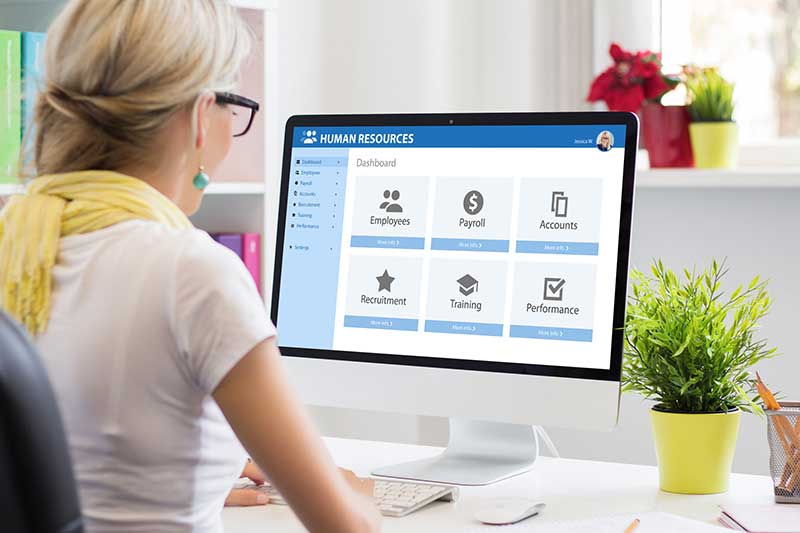Top AI Trends to Boost Your HR Impact in 2024

April 25, 2024
SEB Marketing Team
HR professionals must remain aware of the best practices and tools to deliver high value to their organizations. Today, HR professionals have an array of AI-powered tools and trends at their disposal to enhance their operations. From AI-powered recruitment to virtual HR assistants, these trends promise to empower HR professionals to make data-driven decisions and deliver an enhanced employee experience.
While AI is still considered an early-adoption tool and many organizations have not yet implemented AI as they continue to assess the potential risks, AI-Powered HR tools none-the-less offers numerous benefits worth considering. AI offers tools that can be used to craft job descriptions, as well as identify top talent efficiently with automated resume screening, candidate matching algorithms, and predictive analytics. The manual, time-consuming tasks of resume screening can be replaced with AI-driven recruitment platforms that utilize data analytics to identify patterns and trends in candidate profiles, enabling more informed decision-making and improved candidate selection. Moreover, these tools can help mitigate biases in the hiring process by focusing solely on relevant qualifications and skills, promoting diversity and inclusivity within the workforce.
In 2024, AI- Data-Driven Decision-Making analytics platforms are quickly becoming indispensable for HR leaders seeking to make informed decisions backed by data. The ability of AI to analyze vast amounts of data in record timing, harnessing advanced analytics, provides an advantage for HR professionals seeking to gain deep insights into workforce trends, employee performance, and engagement levels. This data-driven approach empowers HR teams to optimize strategies for talent management, succession planning, and organizational development.
An employee’s experience remains a top priority for HR professionals, and AI offers innovative solutions to nurture a thriving workplace culture. AI-driven sentiment analysis tools and surveys can gauge employee satisfaction and sentiment in real-time, allowing leaders to proactively address concerns and foster a positive work environment. Generative AI is quickly becoming the go-to “workbuddy,” assisting with everything from summarizing long documents to online learning programs and brainstorming options.
Retaining skilled employees who are increasingly focusing more on work/life balance and mental health requires innovative resources. AI can support employee experience through personalized benefits packages as well as create tailored wellness initiatives that analyze employee data to identify trends related to stress, burnout, and mental health issues. By leveraging AI in employee well-being initiatives, HR professionals can create a more supportive and resilient workforce, leading to increased productivity, retention, and overall organizational success.
Virtual HR assistants and chatbots have emerged as a significant benefit for streamlining HR processes and providing instant support to employees. In 2024, these AI-powered assistants that are available 24/7 leverage natural language processing (NLP) and machine learning algorithms to handle routine inquiries, facilitate self-service transactions, and deliver personalized HR support around the clock. From answering common HR-related questions to assistance with screening, and guiding employees through benefits enrollment, virtual assistants enhance efficiency and accessibility across the organization.
Although AI is not meant to replace the well-needed human touch, embracing AI trends has proven to be essential for staying ahead of the curve to realise efficiencies. From improving recruitment processes to enabling data-driven decision-making and enhancing employee engagement, AI empowers HR professionals to drive organizational success in 2024 and beyond. By harnessing the transformative potential of AI, HR leaders can unlock new levels of efficiency, innovation, and employee satisfaction, cementing their role as strategic partners in driving business growth.
Post navigation
Related Posts

Beyond the Resolution: Using “Micro-Habits” to Redesign Your Life
We’ve all been there. January 1st arrives with a burst of "new year, new me"…

The Great Un-Schedule: Why “Blank Space” is Your Most Productive Habit
In a world of instant pings and back-to-back digital huddles, we’ve traded depth for surface-level…

The Objectivity Gap: Why Internal Teams Struggle with Transformation (and How to Fix It)
If you feel like you’re playing a permanent game of "whack-a-mole" with your healthcare budget,…
